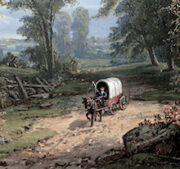Washington County Historical Society version (1965)1
Dec. 14—It is said the Southern troops were victorious. I don’t believe it. Last night three soldiers dressed in blue demanded admittance. I had the dog beside me, so let them in. They demanded money and when I told them there was none, they searched the entire house and took what they wanted. I offered them Confederate money but they refused that. One of them threatened me with his gun and I was glad Fritz wasn’t there. They took coffee, flour, clothing, handkerchiefs, and keepsakes that we had brought from Germany. They remained in the house two hours and left.
The Arkansas Historical Quarterly version (1947)2
Dec. 14
We have been told that the Southern forces won the battle, but I can’t believe it.3 The night of the eleventh three soldiers dressed in Northern uniforms came to the house and demanded that I open the door. If I did not order the dog away and open the door, they said, they would break it down. They demanded money, looked through everything, carried away much stuff. I offered them genuine Confederate money but they would not take it. When one of them threatened me with his musket, I had to thank God that Fritz was not here. The scoundrels took coffee, flour, clothes, shirts, handkerchiefs and some clothes made of especially fine material that Fritz had bought me. They spent two hours, then went away.
- Lemke, W. J. The Hermanns of Old Hermannsburg: Washington County, Arkansas. Fayetteville, AR: Washington County Historical Society, 1965.
- Memoirs, Letters, and Diary Entries of German Settlers in Northwest Arkansas, 1853-1863. Selected and Translated By Clarence Evans, Tahlequah, Oklahoma. The Arkansas Historical Quarterly. Vol. VI Fall, 1947 No. 3
- The Battle of Prairie Grove was “a tactical draw, with the casualties about the same in each army. But the Southern retreat during the night gave the Union a strategic victory, as a full-scale Confederate army would never return to northwest Arkansas, and Missouri remained firmly under Union control. This savage battle was probably the bloodiest day in Arkansas history.”
